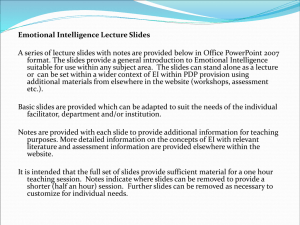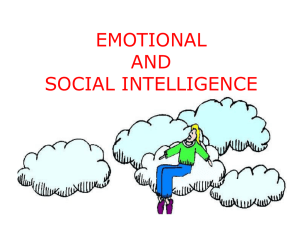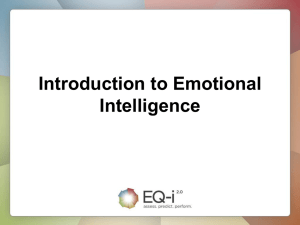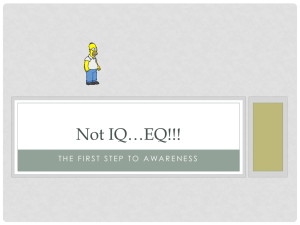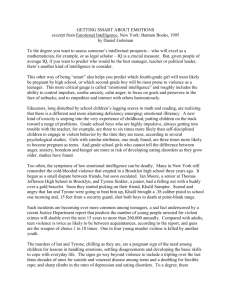File - Farah Hussain
advertisement
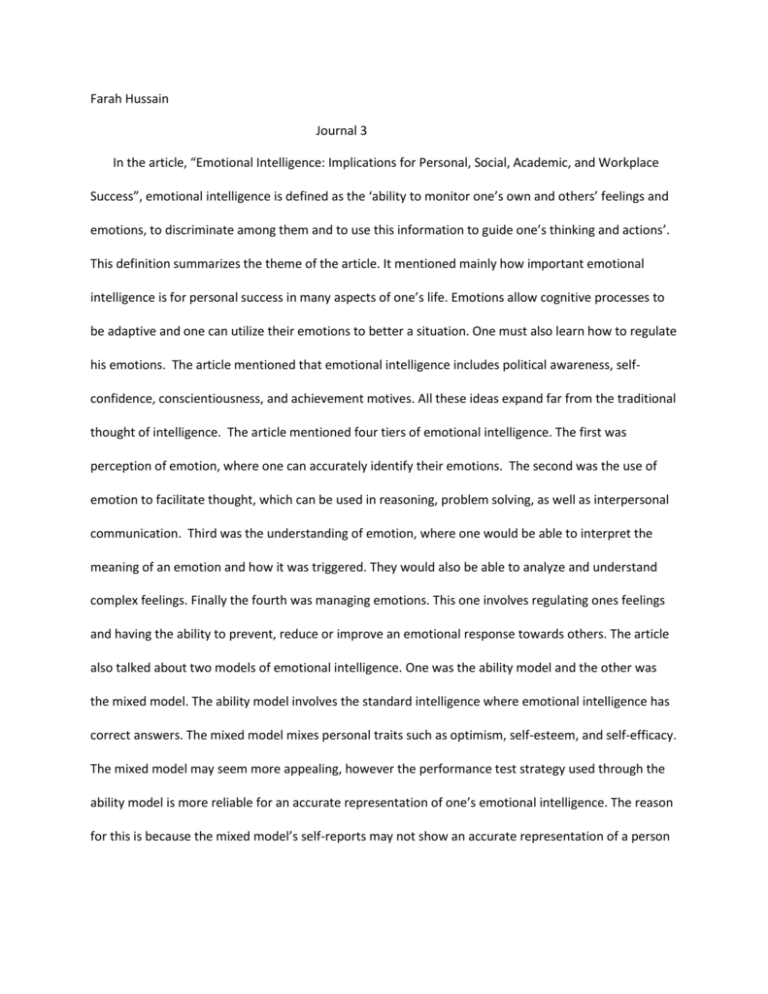
Farah Hussain Journal 3 In the article, “Emotional Intelligence: Implications for Personal, Social, Academic, and Workplace Success”, emotional intelligence is defined as the ‘ability to monitor one’s own and others’ feelings and emotions, to discriminate among them and to use this information to guide one’s thinking and actions’. This definition summarizes the theme of the article. It mentioned mainly how important emotional intelligence is for personal success in many aspects of one’s life. Emotions allow cognitive processes to be adaptive and one can utilize their emotions to better a situation. One must also learn how to regulate his emotions. The article mentioned that emotional intelligence includes political awareness, selfconfidence, conscientiousness, and achievement motives. All these ideas expand far from the traditional thought of intelligence. The article mentioned four tiers of emotional intelligence. The first was perception of emotion, where one can accurately identify their emotions. The second was the use of emotion to facilitate thought, which can be used in reasoning, problem solving, as well as interpersonal communication. Third was the understanding of emotion, where one would be able to interpret the meaning of an emotion and how it was triggered. They would also be able to analyze and understand complex feelings. Finally the fourth was managing emotions. This one involves regulating ones feelings and having the ability to prevent, reduce or improve an emotional response towards others. The article also talked about two models of emotional intelligence. One was the ability model and the other was the mixed model. The ability model involves the standard intelligence where emotional intelligence has correct answers. The mixed model mixes personal traits such as optimism, self-esteem, and self-efficacy. The mixed model may seem more appealing, however the performance test strategy used through the ability model is more reliable for an accurate representation of one’s emotional intelligence. The reason for this is because the mixed model’s self-reports may not show an accurate representation of a person because they took it on their own. Someone could easily fake responses to be more socially acceptable or someone may have a poor realization of themselves. This article provided some important pieces of information which I think can be used at our time in Carson Elementary. We can try to maintain an autonomous positive learning climate so that the children feel comfortable sharing their feelings as well as able to take advice and learn how to maintain their emotions well. We can try to implicate a mini performance test sort of thing where we assess how students react to certain situations. We are already doing that from last week when we performed a skit and the students put themselves in our shoes and told us how they would act towards the situation according to the skit. From teaching the children more emotional vocabulary, they are more aware of their feelings. Teaching the students strategies to identify and regulate their emotions, as well as use their emotions positively would increase their success rate in many aspects of their lives. This can help them in their academic success and their social success. The main point I have conjured up from reading this articles is that emotional intelligence correlates to various other intelligences. For example it relates in the work place, one’s mental health, interpersonal relationships, and academic success. I didn’t know that self-reports were not that reliable in assessing one’s emotions. I have now made a mental note that self-reports aren’t as helpful as performance tests. Someone could very well have false ideas of how they really feel or act in certain situations. In fact, most people do like to say that what they did in a certain situation was the right thing. People like to justify their actions all the time. Self-reports won’t help someone accurately assess themselves, it would just amplify what they had already thought beforehand. Performance tests would give genuine input to one’s behaviors. If I utilize what I learn then I can improve the different aspects of my life and lead to less stress in anxiety provoking situations. I would also be able to handle things better. My weakness is that I lose in in anxiety provoking situations. I know when I think about all the things I have to do, it’s not only for the day but for the next ten years, it really works me up and I become so stressed. My plan is to go to medical school and eventually become a doctor. When I think about all the things I still have to do to stay on that journey, I become very stressed and worked up. Emotional intelligence would help me plan things and have me feeling under control so that I won’t experience as much anxiety. For example, my scheduling skills are much better and I feel much more in control of my life now. It has been reducing stress.
